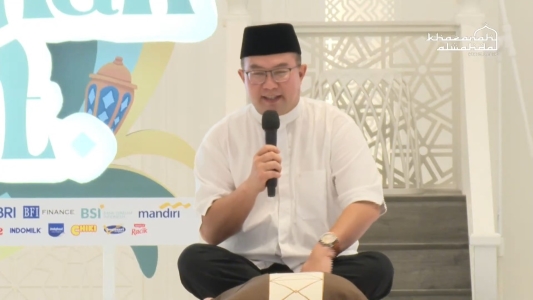Prof Arif Satria: Four Characteristics of the Prophet, Capital for Transformation Towards an Advanced Nation

Prof Arif Satria, Rector of IPB University explained, the Prophet's character needs to be emulated in order to bring the nation into transformation towards progress. This change must capitalize on the four characteristics of Rasulullah SAW, namely siddiq, amanah, fathonah and tabligh.
"Rasulullah SAW gave an example of being a change leader with four capitals. The first is siddiq or telling the truth as the basis of integrity," he said while giving a Ramadan study at the Indonesian Muslim Intellectuals Association (ICMI) Lively Ramadan event at the At-Thohir Mosque, Depok (11/4).
He added, this emotional intelligence (EQ) factor plays the most role in success. In fact, honesty occupies the first position as a success factor from various study sources.
The second trait, he continued, is fathonah or intelligence intellectually, emotionally and spiritually. This intelligence value needs to be owned and followed by high competence.
Third is the nature of trustworthiness or can be trusted as the basis of credibility. "The progress of the nation is determined by a high trust society and is determined by human resources (HR)," he added. According to him, living in a society with a high trust will facilitate substantial collaboration, no longer transactional and instrumental.
“Collaboration-based innovation will generate inspiration and innovation which is closely related to per capita income. This shows that the series of characteristics of the Prophet has such a large sociological dimension," said Prof Arif.
Fourth, Prof Arif explained, is the nature of tabligh, which is to inspire with the aim of transformation and change to become a great nation. This can be achieved if society is filled with agents capable of carrying out the function of tabligh.
“The current transformation is different from the time of the Prophet. Nowadays we face a radically different strategic environment. In this transformation effort, Muslims need a different way of thinking, working and learning. Not only do good deeds, but are required to produce quality work in order to be able to transform," he said.
On this occasion, he also reminded that the best human beings are those who are able to benefit others. Humans must be able to provide great value for others.
"We can be said to be the best people if we can provide benefits that can have a very long-term dimension wherever our position is," he concluded (MW/Rz) (IAAS/Hap)



